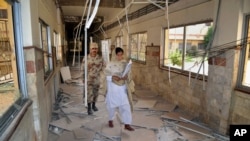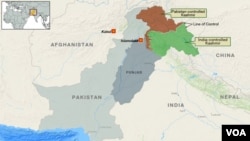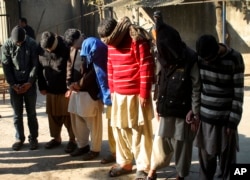Pakistani opposition political parties are expressing outrage after a hard-line cleric of a banned terror group with links to the Taliban and al-Qaida won a legislative seat in the country’s most populous province.
“Rest in pieces National Action Plan,” Bilawal Bhutto Zardari, chairman of the Pakistan People’s Party and son of slain Pakistani Prime Minister Benazir Bhutto, said in a tweet, referring to Pakistan’s counterterrorism initiative.
Masroor Nawaz Jhangvi, son of a Sunni militant group’s slain founder, won the Jhang district by-election for a seat in the Punjab Assembly on Thursday.
Jhangvi defeated candidates fielded by Pakistan’s three largest political parties, including the ruling Muslim League.
Jhangvi’s father helped lead a wave of sectarian violence in Pakistan in mid-1980s.
Lashkar-e-Jhangvi, an offspring of the sectarian group he led, has ties to the Afghan Taliban, al-Qaida and most recently Islamic State militants. The group has been linked by law enforcement to high-profile attacks in Pakistan and Afghanistan.
Effective speaker
Following in his father’s footsteps, Jhangvi works through fiery speeches to incite sectarian violence in a nation ripe for and hard-hit by sectarian terror for the past three decades.
Jhangvi’s election came days after Mohammed Ahmad Ludhianvi, a leading member of another banned group, was allowed by the Lahore High Court to participate in the election. He then withdrew in favor of Jhangvi.
Ludhianvi’s bank accounts in Pakistan have been frozen because of his links to sectarian terror groups.
Dozens of extremist groups have been banned in Pakistan, but many are able to operate under various aliases. Pakistan’s English newspaper, The Nation, reported this year that more than 500 candidates backed by banned groups made their way into Punjab’s local governance system.
Analysts say Jhangvi’s election is a blow to the country’s anti-terror efforts.
“The election result from Jhang is a question mark over the effectiveness of the National Action Plan,” Pakistan-based security analyst Hasan Askari told VOA’s Deewa service.
Terror crackdown plan
The National Action Plan, a counterterrorism initiative started by the government in January 2015, aims to crack down on terror networks. But analysts and opposition politicians say the initiative is loosely enforced. Individuals who have been on a terror watch list, and whose bank accounts have been frozen because of their links to terror groups, should not be allowed to make laws for the country, they say.
“Somebody who should have been behind bars is going to be in the Provincial Assembly instead. How did the Election Commission clear his nomination?” asked Pashtun politician Bushra Gohar.
Punjab remains a harbinger for militant groups, and critics say the government is not doing enough to curb them.
The ruling Muslim League has been accused of having close ties with several banned militant groups in Punjab province.
The Muslim League “has a soft corner for some groups, and it looks like some sort of political bargaining has taken place,” Pakistan’s former secretary of the interior, Tasneem Noorani, told VOA.
The Muslim League denies the accusation.
“Jhang is a special case, and Jhangvi’s victory does not represent the overall atmosphere in the country,” Sadiq Farooq, a Muslim League member, told VOA.
Path to more power
But the provincial election result could pave the way for the extremist group to gain more power in the area, said Pakistani politician Abida Hussain, a former ambassador to the United States.
“Jhangvi’s victory will help his organization win the national assembly seat in the [upcoming] election,” she said.
The repercussions of the Jhangvi victory could be felt in Washington, where U.S. lawmakers have long criticized Pakistan for its leniency toward terrorists.
“It’s going to be very alarming in Washington,” said Washington-based journalist Anwar Iqbal. “Pakistan is claiming that it is winning the war on terror but this [Jhangvi’s win] proves otherwise.”






